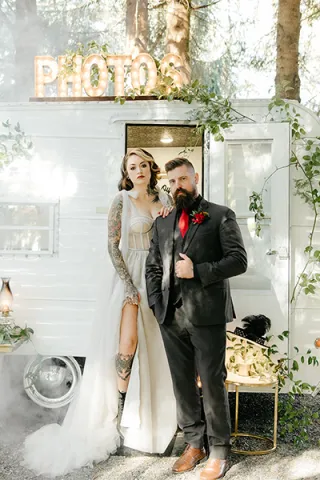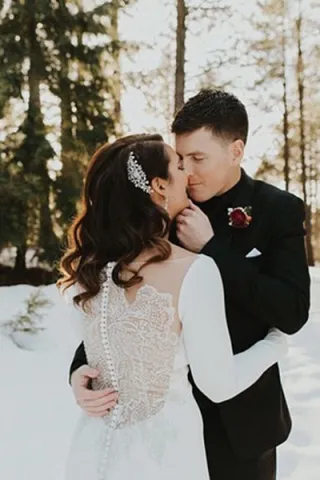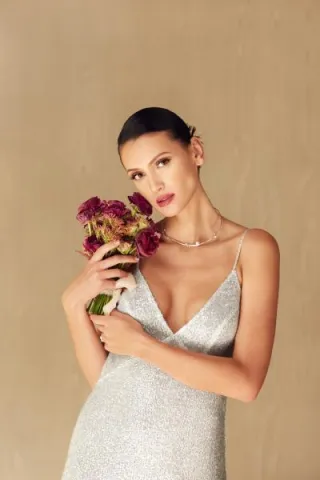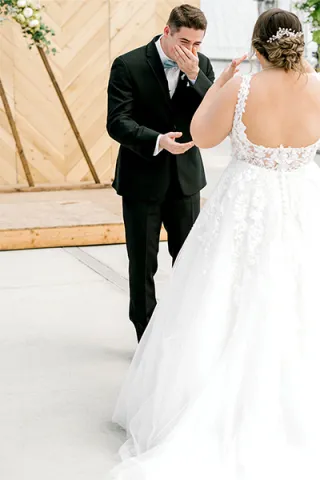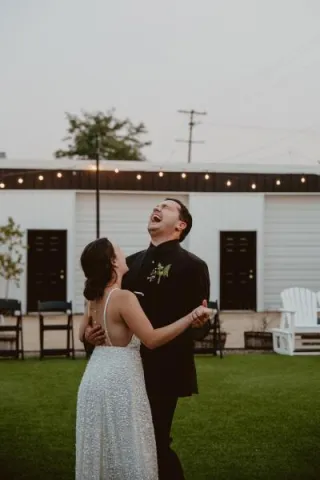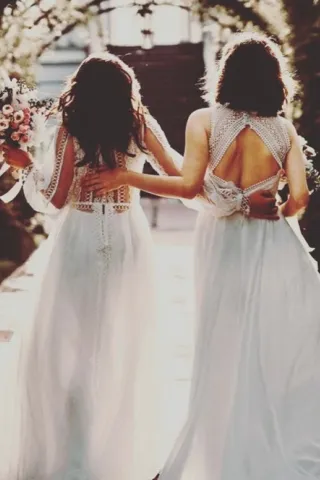With the cost of the average wedding topping $30,000, according to CNN Money, some brides-to-be might be tempted to knock over a bank to pay for their dress. Thankfully, that’s not a thing that happens (or at least, not regularly), but a lot of brides do search for knock-offs of designer wedding gowns.
Saving money is a great idea, but what about stealing someone else’s ideas to do it? When is a knock-off a good move and when (if ever) does it cross the line and break the law?
Is a wedding dress protected by copyright laws?
Under the current copyright laws in the United States, probably not. Copyright protects “original works of authorship.” This includes things like books, movies, sculpture, and architecture. But it doesn’t include a finished article of clothing like a dress.
US copyright law specifically excludes “ideas, procedures, methods, systems, processes, concepts, principles, discoveries, or devices, as distinguished from a description, explanation, or illustration.” In other words, if the pattern (or illustration or instructions to make the dress) is in a “fixed medium” (for example, on paper or in a computer file), it is protected by copyright, but the dress made from the pattern is not protected.
There are some technical exceptions for unique elements that can be separated from the utility of the garment—something like a belt buckle, for example. Also, some avant-garde dresses might qualify as a separate and distinct sculpture and could be eligible for protection that way. However, most dresses wouldn’t qualify, and most brides wouldn’t want to wear a sculpture on their big day.
What about patent protection?
If unique processes or truly unique designs are used to create a dress, those could be protected through the U.S. Patent and Trademark Office (USPTO). A Design Patent might be applicable to some designs, but the designer would need to be able to prove that the design is a "new and non-obvious ornamental design," which would then protect only that specific part of the garment." Also, the patent application process takes months, whereas copyright attaches at the moment of creation.
What about trademark?
A trademark is a “word, name, or symbol” that clearly identifies the source of a particular good. In fashion, this would be logos like the distinctive “G” used by Gucci or the mirrored “C” used by Chanel. These trademarks are absolutely protected by law. Not a lot of bridal gowns carry trademarks or logos and the USPTO is clear about similar, but not infringing products: “Trademark rights may be used to prevent others from using a confusingly similar mark, but not to prevent others from making the same goods or from selling the same goods or services under a clearly different mark.”
“Fashion copyright”
Bills have been introduced over the years that would include protection for garment design. The most recent so-called “Fashion Copyright” bill was introduced by Senator Chuck Schumer (D-NY). The language of Schumer’s 2012 bill would require that a designer who claims that their design was copied show that the original design was, as reported by The New York Times "On the Runway" blog, “a unique, distinguishable, non-trivial and non-utilitarian variation over prior designs.”
Schumer had the support of the Council of Fashion Designers of America and the American Apparel & Footwear Association. His “Innovation Design Protection and Privacy Prevention Act of 2012” made it further than other similar bills, which all died in committee. Schumer’s bill was placed on the Senate Legislative Calendar but nothing ever happened with it.
Beware of counterfeits
There is a world (and often a specific continent) of difference between a knock-off and a counterfeit. US copyright and trademark laws are just that—US laws. Other countries have their own laws and conventions and don’t always protect designers from counterfeit operations. China is a notorious market for counterfeit designer goods, so brides would do well to be wary of purchasing an “original” Vera Wang or Monique Lhuillier gown from an overseas seller. These counterfeits, with fake hangtags and labels, are clear violations of US law.
So, a knock-off is okay?
Generally, the answer is yes. If a bride finds a local dressmaker who can closely replicate the look of a designer gown, it’s not illegal, as long as seller and buyer are very clear that the dress isn’t an actual Vera Wang creation, just one inspired by her.
When Kate Middleton married Prince William, the world went crazy for her Sarah Burton dress. As Mike Masnick pointed out on techdirt, it was very similar to a Gerald Watelet dress worn just a couple of years before by Isabella Orsini who married Belgium’s Prince Eduardo de Ligne. Both dresses bore a strong resemblance to Grace Kelly’s when she married the Prince of Monaco.
It just goes to show that knock-offs aren’t a new thing (or always a cost issue)—and maybe the old cliché is true: imitation is the sincerest form of flattery.
Leigh Raper has a degree in English Literature from the University of Miami and a JD from Pepperdine University School of Law. She received her MFA at the UCR-Palm Desert program for Creative Writing and Writing for the Performing Arts. She writes fiction and blogs about pop culture, as well as items from the world of labor and employment law. Leigh also writes for AvvoStories, brought to you by Avvo, the leading online legal marketplace connecting consumers and lawyers. Avvo’s free Q&A forum with more than 9 million questions and answers, along with on-demand legal services that provide professional counsel for a fixed cost, make legal faster and easier.

